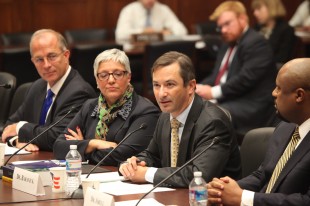Affordable College Textbook Act would support creating open textbooks
Congressional support is building for the Affordable College Textbook Act, legislation that aims to make high-quality, open-education textbooks available free to students, professors and the public. The bill was introduced after the Sept. 18 Capitol Hill testimony of Rice’s Richard Baraniuk, founder of both Connexions and OpenStax College, who told lawmakers about college affordability and open textbooks.
A House version of the bill was introduced last week by U.S. Rep. Rubén Hinojosa, D-Texas, and U.S. Rep. George Miller, D-Calif. Sens. Al Franken, D-Minn., and Dick Durbin, D-Ill., introduced the Senate version of the bill last week.

Witnesses before the committee included, from left, Jeffrey Docking, president of Adrian College; Paula Singer, president and chief executive officer of Laureate Global Products and Services in Baltimore; Baraniuk; and Charles Lee Isbell Jr., professor and senior associate dean, College of Computing, Georgia Institute of Technology. Photo courtesy: U.S. House Subcommittee on Higher Education and Workforce Training
Baraniuk testified at a hearing of the U.S. House Subcommittee on Higher Education and Workforce Training.
Baraniuk, Rice’s Victor E. Cameron Professor of Engineering, told lawmakers that the high and rapidly increasing cost of traditional textbooks is a significant barrier for many college or would-be college students, and described how OpenStax College is saving students money with its growing catalog of free, high-quality open textbooks.
“We created OpenStax College to directly address the issue of affordability and access,” Baraniuk said. “In the short time they have been available, our books have been used millions of times online and at more than 360 institutions.”
Hinojosa, the ranking Democrat on the subcommittee, said, “When buying a textbook becomes a barrier to education, you know something has to be changed, and that’s exactly what we want to achieve with the Affordable College Textbook Act. I have always strived to make college more accessible and more affordable for students, and this legislation will lessen the high cost of an important commodity for learning while helping students save money.”
This bill, H.R. 3538, would create a competitive grant program for institutions of higher education to create and expand the use of “open textbooks,” online texts that are licensed under terms that grant the public the right to freely access, customize and distribute the material.
“This legislation is welcome because it supports academic freedom and provides incentives for faculty, institutions and both for-profit and nonprofit organizations to improve access to high-quality materials,” Baraniuk said.
Textbook costs are one of the most overlooked costs of going to college, but they can be substantial and can be a barrier to attaining a college education. According to College Board, the average student budget for college books and supplies during the 2012-2013 academic year was $1,200.
The Affordable College Textbook Act has 20 House co-sponsors, and the bill has also attracted support from nonprofit groups, including Creative Commons and the Scholarly Publishing and Academic Resources Coalition.
“The current textbook publishing market has little competition, leaving students stuck with few options and drastically high prices,” said U.S. PIRG Higher Education Associate Ethan Senack. “With open textbooks, the cost-saving potential for students is massive — around 80-100 percent compared with published textbooks. This bill harnesses the power of innovation and technology to give students a more affordable education, and we applaud Congressmen Hinojosa and Miller for their leadership on the issue.”
The Affordable College Textbook Act would:
- Create a grant program to support pilot programs at colleges and universities to create and expand the use of open textbooks with priority for those programs that will achieve the highest savings for students.
- Ensure that any open textbooks or educational materials created using program funds will be freely and easily accessible to the public.
- Require entities that receive funds to complete a report on the effectiveness of the program in achieving savings for students.
- Require the Government Accountability Office to report to Congress by 2017 with an update on the price trends of college textbooks.


Leave a Reply